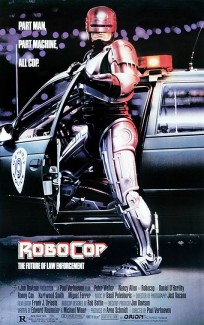Robocop (Paul Verhoeven, 1987): USA
Reviewed by Richard Feilden. Viewed on DVD.
Like the other reviewers on this site, I was recently asked to put together a list of the best films ever released. You’ll see the results soon, but let me say right now that it was an impossible task. Within moments of writing it I knew I’d made mistakes – right now I’m realizing that Jean Renoir’s The Grand Illusion is missing, an unforgivable omission – but it did make me think about the films I love, and one of those is Robocop. Yes, I forgot a classic that celebrates humanity and condemns national pride, but found space for an overgrown street-mime in a fiberglass armor-suit. Never trust a top-ten list!
So, what on earth made me think of Paul Verhoeven’s cyberpunk neo-noir when I was putting together my list? On the surface, it sounds like any number of high-concept cyborg films, many of which ended up swelling the straight-to-video ranks in the 1980s. In a future where a giant corporation, Omni Consumer Products, owns the Detroit police department, a mortally wounded cop is resurrected in a new tin skin. Programmed to serve the community, OCP sends him out to rid Detroit of crime, so that it’s dream of a gleaming, futuristic cityscape can be realized on schedule. But the companies corrupt VP has other plans and, in league with old Detroit’s organized crime boss, he schemes to unplug the cop with a heart of chrome. It’s hardly ‘classic’ material, is it?
But, like a stage magician, Robocop has a trick or two concealed up its sleeves. In Ronny Cox and Kurtwood Smith it has a superb pair of villains. Cox’s corporate shark schmoozes and sneers, while Smith manages to keep his cop-killer crime boss both smart enough to be believable and psychotic enough to be chilling. Peter Weller in the title role is much more comfortable once he has the shiny helmet on, but once he does, his physical acting creates a truly sympathetic Frankenstein’s monster, and the armor’s heft lends the film a sense of reality that shames any work I’ve seen the CGI wizards accomplish.
That isn’t to say that the film doesn’t have special effects. Robocop himself, once the Judge Dredd-esque helmet comes off, is a masterpiece of grotesque makeup and prosthetic work. In addition, there is the monstrous ED-209, a gargantuan, lumbering robot that Robocop replaces when it malfunctions. In this pre-CGI-extravaganza era, the work is handled though stop motion animation. Now, that might sound terribly quaint, but the effects are coordinated by Phil Tippit, the man behind the AT-AT troop carriers from The Empire Strikes Back. In his hands the stop motion work isn’t a handicap, it’s an advantage. The artificial edge that it brings adds a clockwork menace to ED-209, something that ties so superbly to its role in the film. And that’s where Robocop truly begins to elevate itself.
Robocop is an ‘ideas’ film, wrapped up in an action-film disguise. It’s a cinematic wolf in sci-fi clothing. It raises questions of life and death and satirizes the corporate greed that defined the 80s. It’s packed with TVs playing revolting, misogynistic game shows and soul-sucking adverts which implore you to celebrate your wealth with a gas-guzzling car, or take pleasure in death with a cold-war nuclear Armageddon board game that’s fun for all the family! ED-209, unfeelingly following his flawed logic, embodies senseless bureaucracy at its worst. He’s a speed camera that’s replaced a patrol officer, an unmonitored CCTV camera recording the horror but unable to intervene, and an inflexible three-strikes law, all rolled into one. Robocop wants you to think about the world, but the medicine comes served on a spoonful (or perhaps bucketful would be more appropriate as the film was originally cut to prevent it being slapped with an X rating) of ultra-violence.
Robocop is certainly a film of its moment. While some themes (environmental destruction, a news channel that promises to tell you all you need to know about the world in three minutes) have perhaps grown in the public conscience since its release, others, like the cold war, have thankfully receded. But that doesn’t diminish the film’s power. Like James Cameron’s original Terminator, it still stands head and pneumatic shoulders above its many siblings and bastard offspring.

4 Comments
Jump to comment form | comments rss [?] | trackback uri [?]